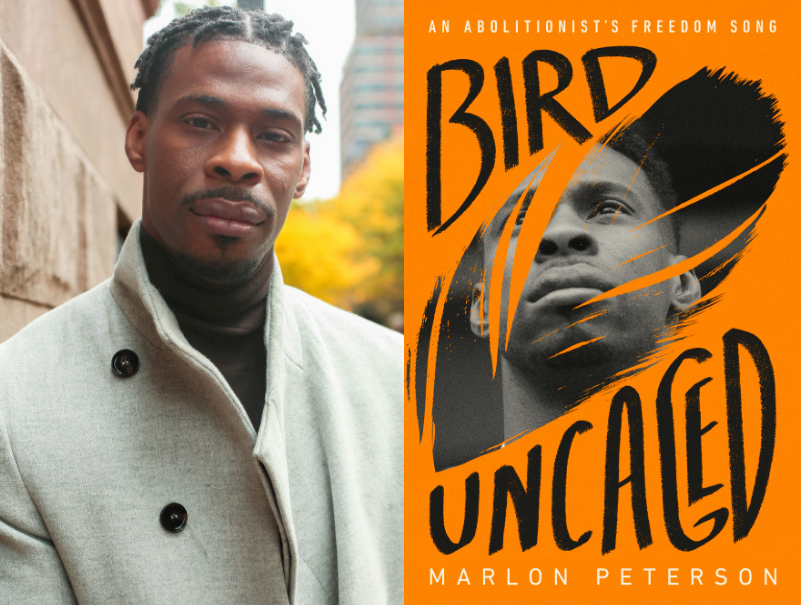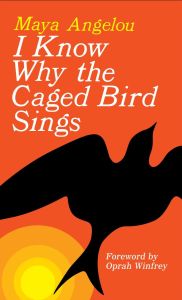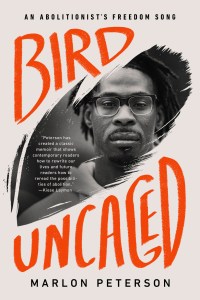Marlon Peterson

Marlon Peterson (he/him) is the principal of The Precedential Group, a social justice consulting firm. He is host of the Decarcerated Podcast, a Senior Atlantic Fellow for Racial Equity, a member of the Aspen Global Leadership Network, and a 2015 recipient of the Soros Justice Fellowship. Ebony Magazine has named him one of America’s 100 most influential and inspiring leaders in the Black community and his TED Talk, “Am I not human? a call for criminal justice reform,” has over 1.2 million views. .
Bird Uncaged challenges the typical “redemption” narrative and our assumptions about justice. With vulnerability and insight, Peterson uncovers the many cages—from the daily violence and trauma of poverty, to policing, to enforced masculinity, and the brutality of incarceration—created and maintained by American society. A twenty-first-century abolitionist memoir, and a powerful debut that demands a shift from punishment to healing, an end to prisons, and a new vision of justice.
Buy the Book.
 Poetic, honest, Black.
Poetic, honest, Black. IThe book title is inspired by Maya Angelou’s I Know Why the Caged Bird Sings and the Alicia Keys song “Caged Bird.” I read the book around the same time I first heard the song. I was in prison at the time. My need to express that invisible cages and visible prisons are harmful human creations is what compelled me to write this memoir.
IThe book title is inspired by Maya Angelou’s I Know Why the Caged Bird Sings and the Alicia Keys song “Caged Bird.” I read the book around the same time I first heard the song. I was in prison at the time. My need to express that invisible cages and visible prisons are harmful human creations is what compelled me to write this memoir.
 For sure, Maya Angelou, oh, and Nelson Mandela.
For sure, Maya Angelou, oh, and Nelson Mandela. 2021 Soca music from Trinidad Carnival and the Judas and the Black Messiah soundtrack.
2021 Soca music from Trinidad Carnival and the Judas and the Black Messiah soundtrack.
Abolition. Feminism. Now. by Gina Dent, Beth Richie, Erica Meiners, Angela Davis.
From a leading prison abolitionist, a moving memoir about coming of age in Brooklyn and surviving incarceration—and a call to break free from all the cages that confine us.
Marlon Peterson grew up in 1980s Crown Heights, raised by Trinidadian immigrants. Amid the routine violence that shaped his neighborhood, Marlon became a high-achieving and devout child, the specter of the American dream opening up before him. But in the aftermath of immense trauma, he participated in a robbery that resulted in two murders. At nineteen, Peterson was charged and later convicted. He served ten long years in prison. While incarcerated, Peterson immersed himself in anti-violence activism, education, and prison abolition work.
In Bird Uncaged, Peterson challenges the typical “redemption” narrative and our assumptions about justice. With vulnerability and insight, he uncovers the many cages—from the daily violence and trauma of poverty, to policing, to enforced masculinity, and the brutality of incarceration—created and maintained by American society.
Bird Uncaged is a twenty-first-century abolitionist memoir, and a powerful debut that demands a shift from punishment to healing, an end to prisons, and a new vision of justice.
Marlon Peterson grew up in 1980s Crown Heights, raised by Trinidadian immigrants. Amid the routine violence that shaped his neighborhood, Marlon became a high-achieving and devout child, the specter of the American dream opening up before him. But in the aftermath of immense trauma, he participated in a robbery that resulted in two murders. At nineteen, Peterson was charged and later convicted. He served ten long years in prison. While incarcerated, Peterson immersed himself in anti-violence activism, education, and prison abolition work.
In Bird Uncaged, Peterson challenges the typical “redemption” narrative and our assumptions about justice. With vulnerability and insight, he uncovers the many cages—from the daily violence and trauma of poverty, to policing, to enforced masculinity, and the brutality of incarceration—created and maintained by American society.
Bird Uncaged is a twenty-first-century abolitionist memoir, and a powerful debut that demands a shift from punishment to healing, an end to prisons, and a new vision of justice.

